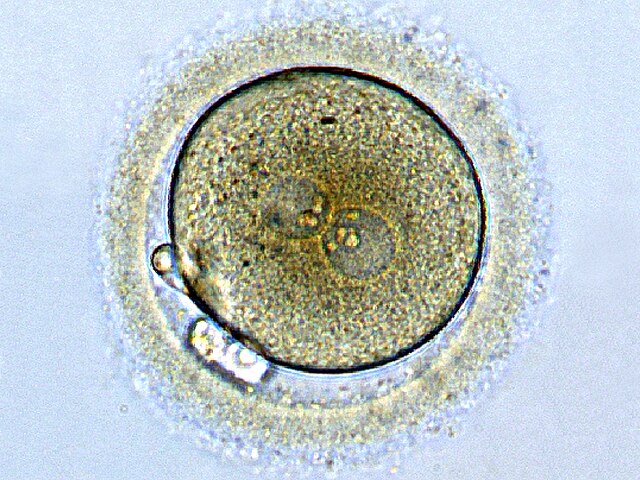The recent consternation about frozen zygotes, in vitro fertilization and “fertilized egg personhood” laws made me think of the American Zen teacher Robert Aitken (1917-2010), who said a lot of wise things. In Aitken’s book The Mind of Clover: Essays in Zen Buddhist Ethics (North Point Press, 1982), he wrote, “The absolute position, when isolated, omits human details completely. Doctrines, including Buddhism, are meant to be used. Beware of them taking life of their own, for then they use us.” I think this is a good description of the trap some politicians are stuck in now.
Please note: It’s my understanding that a newly fertilized human egg is not an “embryo” but a “zygote.” The fertilized egg doesn’t develop into an “embryo” until after it’s implanted in a uturus. So I’m calling them “zygotes.” I also do not intend to argue with anyone’s sincerely held belief that abortion is morally wrong. I do intend to argue that separation of church and state is a really, really good idea.
Why Frozen Zygotes Are in the News
To recap, the Alabama Supreme Court recently decided that frozen “embryos” are children, with all the rights and protections of children. The decision came about because some frozen zygotes stored in a Mobile hospital were removed and inadvertengly destroyed by a curious patient who wandered into the storage area. The couples whose zygotes were destroyed wanted to bring a “wrongful death” suit against the hospital. Lower courts had said this wasn’t permissible, but the state Supreme Court reversed the rulings of lower courts and sided with the couples.
In the court’s majority opinion, Associate Justice James Mitchell wrote that “an unborn child is a genetically unique human being whose life begins at fertilization and ends at death. The parties further agree that an unborn child usually qualifies as a ‘human life,’ ‘human being,’ or ‘person,’ as those words are used in ordinary conversation and in the text of Alabama’s wrongful-death statutes.” So there we are. A zygote, which is defined in a biology textbook as “a diploid cell resulting from the fusion of two haploid gametes,” has the same legal status as a child.

Frozen Zygotes: Unintended Consequences
Anti-abortion activists had barely finished their first hurrah when the unintended consequence appeared. Fertility clinics in Alabama announced they were suspending operations. Clinics have been sued for damages before when zygotes were accidentally destroyed. But “wrongful death” can result in criminal charges, not just civil suits. This created too much legal liability for Alabama fertility clinics.
The in virto fertilization (IVF) process results in many destroyed zygotes. And this is not just accidental. The process of obtaining eggs and fertilizing them in a lab very often results in more fertilized eggs than the couple will ever use. Not every egg/sperm combination will result in a viable zygote, so doctors typically fertilize several eggs at once. This increases the odds of achieving at least one healthy implanted embryo, but it also often creates a surplus. Fertilizing fewer eggs greatly reduces the chances for a baby, or might force the couple to undergo the expensive process of harvesting eggs several times.
The couple may choose to have the surplus eggs stored by cryogenically freezing them, or they can choose to donate the eggs to another childless couple, or to a research lab, or discard them immediately. If the eggs are stored it’s understood they won’t be stored to the end of time. For that matter, clinics are charging couples hundreds of dollars a year to store eggs; what if they fail to pay? Will the zygotes become wards of the state? There’s even a quesion whether unused zygotes can be frozen at all under Alabama law. And accidents do happen, and the cryogenic freezing process can fail for a number of reasons. Of course, in nature approximately 60 percent of fertilized human eggs will perish before developing into a baby. But by bestowing personhood status on zygotes, the Alabama court decision greatly complicates the IVF process and could force IVF clinics to go out of business.
Frozen Zygotes and Muddled Messaging
It turns out IVF is very popular, and most people think it should be available to infertile couples. The attorney general of Alabama promptly assured the state he had no intention of prosecuting fertility clinics. Of course, he can’t speak for future attorneys general. And the clinics remain in suspension. A state lawmaker quickly introduced legislation that would make frozen zygotes into frozen zygotes again, legally speaking. ABC News reported, “Facing a wave of shock and anger from the decision, legislators prepared separate proposals in the House and Senate that would seek to prevent a fertilized egg from being recognized as a human life or an unborn child under state laws until it is implanted in a woman’s uterus.” As of this writing the legislation has gone nowhere, however.
In “Smoke and mirrors: What Republicans are really saying about IVF” by Judd Legum at Popular Information, we learn that many conservative politicians are issuing statements in support of IVF while continuing to push for “zygote personhood” laws that would shut down IVF clinics. “In this Congress, 124 House Republicans — including House Speaker Mike Johnson (R-LA) — are co-sponsoring the Life at Conception Act,” Legum writes. He quotes from the bill — “the terms ‘human person’ and ‘human being’ include each and every member of the species homo sapiens at all stages of life, including the moment of fertilization.” Further, “Congress hereby declares that the right to life guaranteed by the Constitution is vested in each human being.” This bill, if it became federal law, would devastate the IVF industry nationwide. But its sponsors are not going to tell you that. They probably can’t tell themselves that.
I’d like to add that to conceptualize a zygote as a “human being” because it is living human tissue is only one way to define “human being.” I don’t think science would agree that a zygote is a being . To extremely simplify Buddhist teaching, a “being” according to Buddhism comes about from the confluence of five types of attributes — a body, senses, the mental functions of cognition or perception, the psychological functions that include predilections, biases, and the rest of our general psychological messiness, and awareness or consciousness. To a Buddhist, a zygote is not a being, human or otherwise. A woman, however, is.
Moral Absolutism or Moral Blindness?
Ethicists tell us that moral absolutism is a form of deontology, which is an ethical theory that applies fixed rules to distinguish right from wrong. Some philosophers have proposed that there are universal moral laws that every human civilization has followed. I would suggest that there are some rules that everybody has to accept before civilization can happen. If communities couldn’t agree to prohibit theft and murder, for example, we humans would still be huddled in caves guarding our flint arrowheads.
But this takes us to separating which moral rules are essential for maintaining civil order — and usually are written into law — and which are not. If you are a religious person, your religion might be telling you what the rules are. But in a secular society, laws are strictly about maintaining civil order, not pleasing gods. Just to pick a non-controversial, I hope, example, some religions require women to keep their hair covered in public. But there is no civil purpose served in mandating hair coverings for women in public.
If you are a moral absolutist, I assume it makes logical sense that application of moral absolutes must be pure and unsullied. If killing a human being is wrong, it must be always wrong, although some do make exceptions for the death penalty. And if we then apply the Alabama justice’s argument that a fertilized human egg is human life and a unique human being, we must conclude that destroying a zygote is wrong and must be legally prohibited. But, as we’ve seen, there are consequences.
And there have been lots of consequences from overturning Roe v. Wade. Every week since Roe v. Wade was overturned has brought some new horror story of women who nearly died — or actually died — because doctors would not terminate their disasterous pregnancies for fear of prosecution. Even while news media were full of stories and editorials about the Alabama court decision, there was another story out of Texas about a woman with an ectopic pregnancy who was denied treatment by a Texas hospital that feared prosecution for performing an abortion. In some cases, lawmakers who are confronted with the suffering caused by the laws they passed respond by insulting women nearly killed by abortion bans. It’s as if they are angry with women who aren’t able to follow some happily-ever-after-Roe script. How do we reconcile this?
Hang the Consequences?
Moral absolutism results in a lot of willful denial of consequences. For years anti-abortion activists have declared that there is never a legitimate medical reason to terminate a pregnancy, which is just plain not true. Pregnancies can become life threatening in several ways. The notion that rape never results in pregnancy is also popular, and also not true. From a recent article in Scientific American — “A new study estimates that more than 64,000 pregnancies resulted from rape between July 1, 2022, and January 1, 2024, in states where abortion has been banned throughout pregnancy in all or most cases.” I propose that if you have to tell lies to yourself to maintain your moral purity, there may be a problem.
There are other approaches to morality beside deontology. One is the consequentialist approach, in which one weighs the consequences of an act to determine if it is moral. This approach gets sneered at by absolutists as “moral relativism.” An obvious weakness of a consequentialist approach is our infinite human capacity to BS ourselves. Consequentalism requires some degree of self-honesty, or else it’s much too easy to persuade ourselves that an outcome good for us, never mind everybody else, must be a moral one and serve a greater good. But the absolutist approach isn’t free of the same pitfall of willful delusion, as we’ve already seen.
One of the oldest recommendations for weighing consequences comes from a sermon of the Buddha, delivered about 26 centuries ago. In the Kalama Sutta of the Pali Canon (Anguttara Nikaya 3:66), the Buddha walked his audience through some rigorous criteria to determine if a course of action might lead to harm and suffering and should not be taken. He also advised cultivating the virtues of compassion, loving kindness, mudita (empathetic joy for the good fortune of others), and equanimity; and to be be free of greed, ill will, and delusion. Perhaps hanging on to a few rules while one works on that is not a bad idea. It is unfortunately the case that there are mistranslations of the Kalama all over social media that make it sound like a permission slip to believe whatever you like, which it is not; see “Lost in Quotation” by Thanissaro Bhikkhu.
The Middle Way of Compassion
Now we come back to the quote by Robert Aitken: “The absolute position, when isolated, omits human details completely. Doctrines, including Buddhism, are meant to be used. Beware of them taking life of their own, for then they use us.” In context he was not talking about moral absolutism, exactly but about a Buddhist doctrine regarding the absolute and relative aspects of reality. I’m not going to attempt to explain that here (although I have attempted to explain it elsewhere). His point was that focusing exclusively on the absolute whiile ignoring the relative can lead to some horrific consequences. And, in a way, that’s what our moral absolutists are doing.
And I think this quote perfectly describes the problem right-wing politcians have created. They are so invested in their absolute rule that it has ceased to be any sort of moral guide. Now it’s just a box they are stuck in. Moral theory that completely ignores the consequences, the infinite messiness and complications of human life, is not moral. Moral theory that prioritizes zygotes, morulas, blastocysts, and embryos over all else, including women facing strokes, limb amputations, organ failure, and death is not moral. It just isn’t. And when written into law, such moral theory is nothing but theocratic dictatorship.
Later in The Mind of Clover, Aitken wrote of the middle way of compassion. This middle way includes both absolute and relative, both the moral principle and the messy consequences. Genuine morality requires being aware of both, and not letting one erase the other. Genuine morality sometimes requires making hard decisions, but it also requires compassion. I’m looking for compassion in the effort to save every zygote no matter what. I’m not seeing it.













